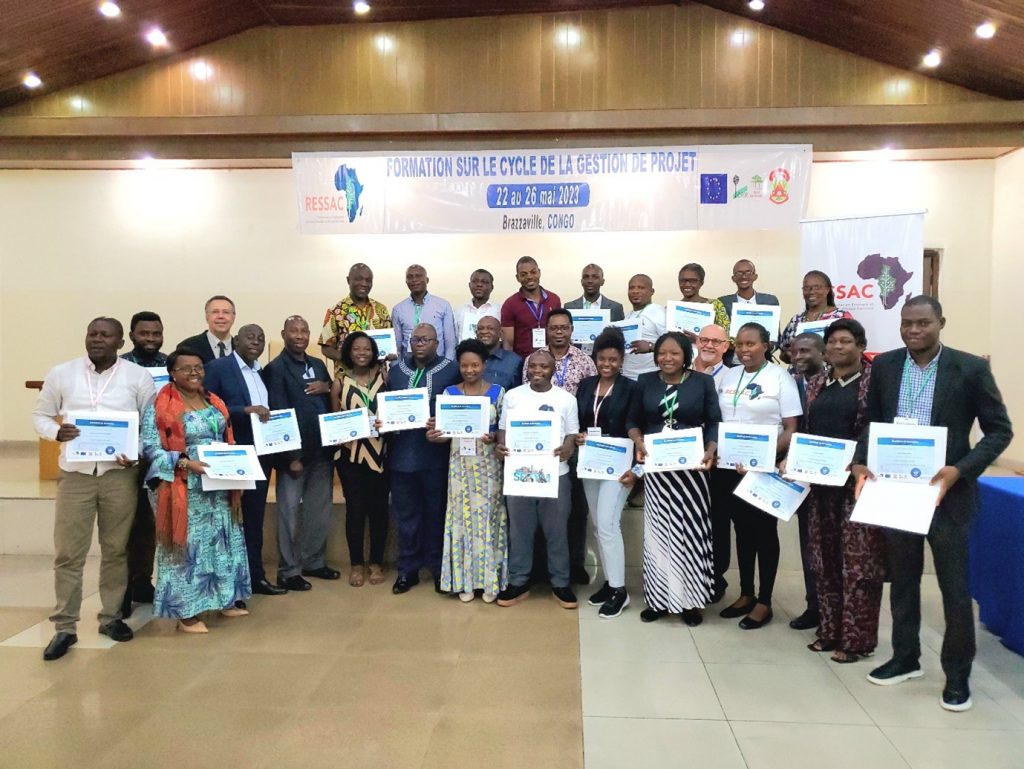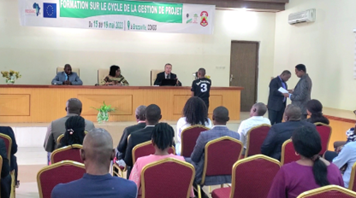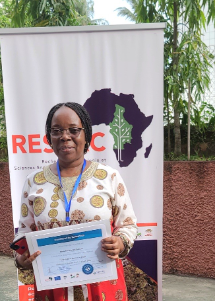Forest sector actors from 11 member countries of the Central African Forest Commission (COMIFAC) space benefit from capacity-building training in the project management cycle.
By Merilyne Ojong

Dominique Xavio Imbabazi is an engineer in Kigali, Rwanda with a keen passion for smart agriculture and environmentally friendly solutions. He founded Golden Insects Ltd., a pioneering company specialising in the commercial and professional breeding of insects and insect-associated organisms for food security, nutrition and health in Rwanda. Imbabazi sells his insect-derived products to farmers and companies and his ambition is to raise funds to expand his insect farm.
For many years, Imbabazi had approached donors with proposals highlighting the great potential and importance of insects to improve the livelihood and well-being of populations in his region. However, he was never able to attract funding for his farms.
His experience is similar to that of many researchers and green entrepreneurs in Africa, particularly those in Central Africa, who find it challenging to find funding for their projects.
A study conducted by CIFOR-ICRAF in 2019 reveals that out of international financial flows to the forest-environment sector in Central Africa (which includes the Congo Basin), only 11.5% of international funding is allocated to the management and conservation of tropical forests. Over 88% of this funding goes to South America and Southeast Asia.
“The low capacity of actors in the Central African sub-region to submit high-quality, bankable project proposals to international funding sources can explain this disparity,” says Richard Eba’a Atyi, CIFOR-ICRAF’s Regional Convener for Central Africa.
Atyi adds that “this low capacity particularly concerns the research and training sectors, which receive less than 1% of the funding allocated to Central Africa. We believe that research and training are the keystone of any quest for sustainable development, which is why we attach great importance to building the capacities of our partners in the countries where we are active.”
In April and May 2023, through a project called RESSAC (Recherche appliquée en écologie et en sciences sociales en appui à la gestion durable des écosystèmes forestiers d’Afrique centrale) on applied research in ecology and social sciences in support of sustainable management of forest ecosystems in Central Africa, CIFOR-ICRAF organised four training sessions in Libreville and Brazzaville on the project management cycle, targeting 100 researchers, public sector executives, actors involved in the sustainable management of Central African forests and representatives of civil society organisations of 11 member countries of the COMIFAC (Central African Forest Commission) space – Angola, Burundi, Cameroon, Central African Republic, Chad, Gabon, Republic of Congo, Democratic Republic of Congo, Equatorial Guinea, São Tomé and Príncipe and Rwanda.
“This training on project development and management comes at just the right time, given that we are on the heels of the One Forest Summit held here in Libreville, says Donald Midoko Iponga, Director of the Research Institute for Tropical Ecology (Institut de Recherche en Écologie Tropicale de Libreville – IRET) in Libreville.
“One of the weaknesses identified for research centres at the sub-regional level during this Summit was their low capacity to attract funding,” he added. “The partners we work with have understood from statistics that our research centres and universities need to be boosted to position themselves in line with the important role of the forests of the Congo Basin for better sustainable management of forest ecosystems.”
The RESSAC programme is a four-year initiative funded by the European Union and launched in 2022. It aims to steer research towards operational solutions designed and implemented in the field by actors facing the multiple challenges of sustainable natural resource management as part of their mandate or productive activities.
In Brazzaville, the programme also partnered with the University of Marien Ngouabi in the Republic of Congo to identify resource persons and participants in need of capacity building in project management to benefit the resource management of the forests of the Congo Basin which are home to some 30 million people.

Delivered by SETYM International, a Canadian training company specialising in capacity building, the modules of the project management cycle training focused on aspects such as project proposal writing, the logical framework and budgeting. Participants were encouraged to identify problems in their environment, suggest solutions based on their expertise and design draft projects.
“My team and I had identified environmental issues and themes in my country which we suggested solutions to via proposals submitted to donors for funding. Although the pertinence of projects was established at various levels, we were never able to convince international financial institutions to support our projects. After completing this training, I clearly see the aspects which were missing in my project proposals as well as the areas in which I need to improve for my projects to be competitive,” says Cecilia Engonga Abang, Technician at the Ministry of the Environment in Gabon.

The expected added value of the RESSAC programme does not only reside in the fact that it provides funding for ecological and social science research in support of sustainable forest management in Central Africa. The programme also aims to support and coach these beneficiaries in the design and implementation of projects capable of rapidly and concretely influencing the operating and production methods of field actors involved in the management and exploitation of natural resources in the Congo Basin.



